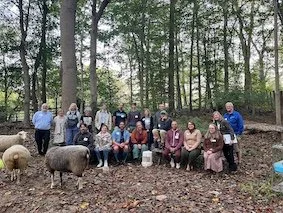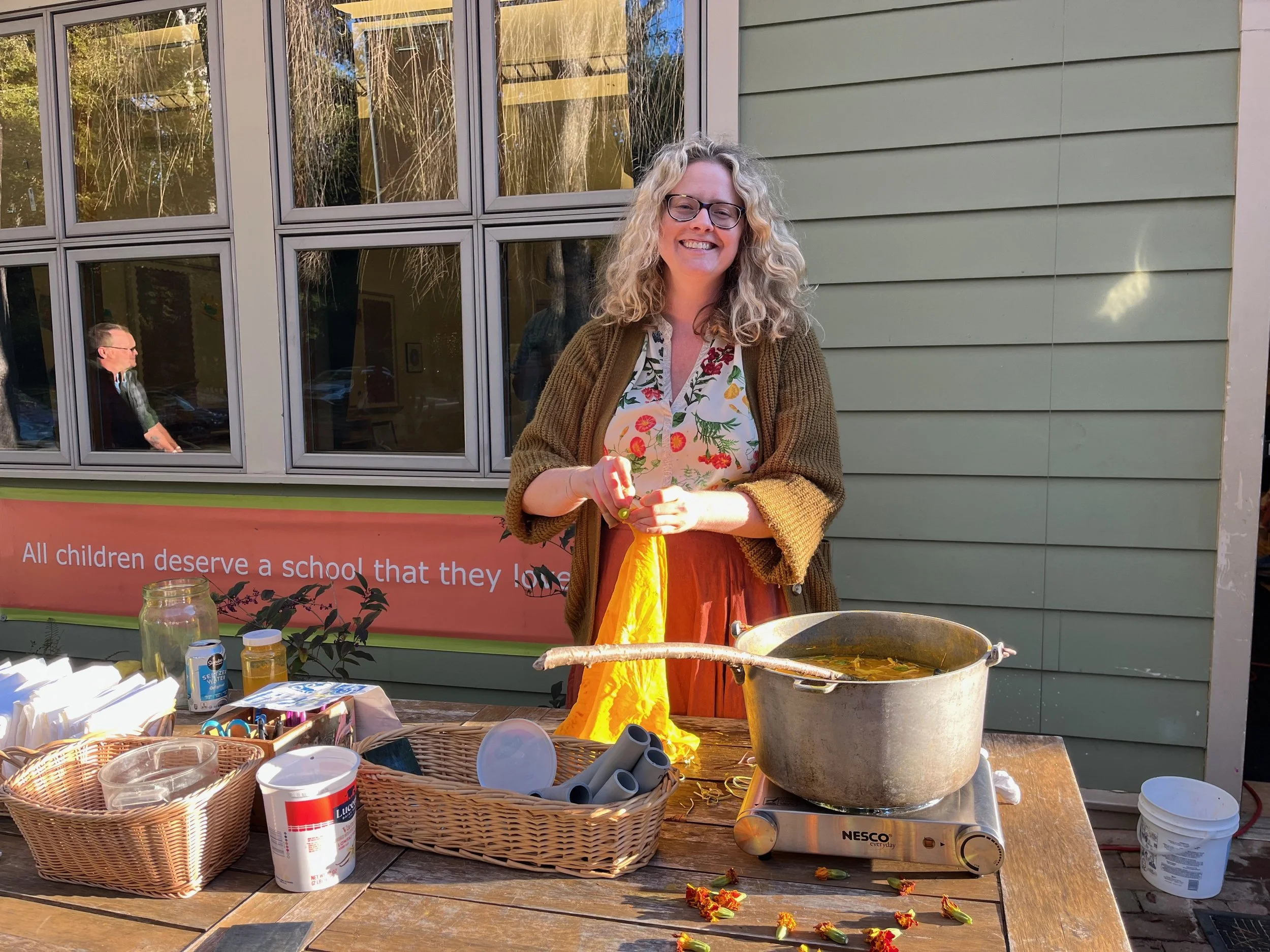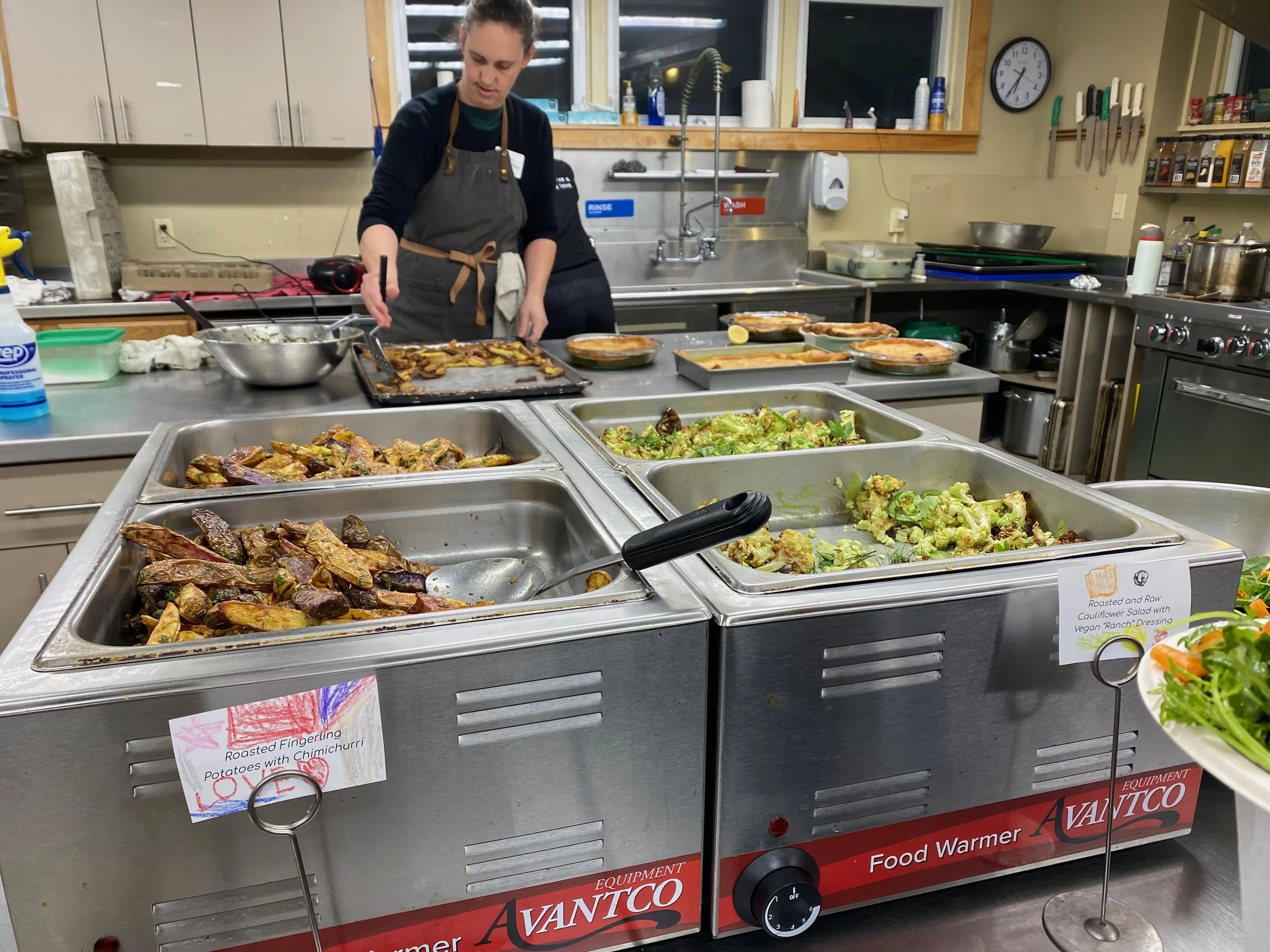Twenty-three educators, sustainability coordinators, and administrators from PAISBOA member schools gathered at The School in Rose Valley (SRV) for the PAISBOA Sustainability meeting, co-organized by PAISBOA and Boyer Sudduth Environmental Consultants (BSEC) on October 9th, 2025. This event provided a space for participants to share ideas, highlight campus initiatives, and strengthen connections around environmental sustainability.
The attendees represented a wide range of experiences, with a shared commitment to advancing sustainability within their schools.
The meeting’s attendees gather in the outdoor classroom, with the school’s three ewes. At SRV students have hands-on learning experiences with their environment, food, and sustainability choices. (Source: BSEC)
Following a welcome from SRV’s Director of Business & Finance, Nava Hall, Science teacher Paul Rule, and Farm to Fork Manager Hilary Leifsen launched into an overview of the school’s Farm-to-Fork Food & Education Program. This unique hands-on experience offers students exposure to sustainable food systems and allows for curriculum collaboration, integrating math, literacy, science, and social studies. Rule and Leifsen explained how SRV’s 3,000-square-foot organic garden, home to a flock of chickens and sheep, works in partnership with local farms to provide seasonal vegetables and crops. Together, these ingredients form the foundation of students’ daily lunches. Emphasizing environmental stewardship, equity, and community well-being, the program involves students in every step of the food cycle, from planting seeds in the garden, to harvesting and eating its bounty at lunch.
Courtney Seltzer, SRV Art Teacher, leads a demonstration on natural dyes to highlight sustainability features of the campus garden and how they are integrated across curriculums. (Source: BSEC)
SRV art teacher Courtney Seltzer offered a “natural dye” activity to participants, using natural dyes, such as turmeric and marigold (grown from the school’s garden). Meeting attendees tested the natural dyes by coloring scarves and bandanas. Seltzer shared that students also card and comb wool from the campus ewes and that plans are underway to add a “natural dyes garden” in collaboration with the science department.
Science teacher Paul Rule showcased the School’s organic farm and raised beds. The group met other local inhabitants: including 28 chickens and 3 sheep. Rule explained that each age group is responsible for caring for the campus garden, from planting tomatoes to collecting eggs and feeding the sheep. This unique setup provides hands-on learning opportunities and highlights students’ role in caring for their food and environment.
The campus garden operates in close connection with the rest of the School. Produce and eggs are regularly used in the cafeteria, while farm waste and food scraps are composted to create fertile soil for future crops and feed for the animals. Attendees asked questions and shared tips from their own schools’ experiences.
The tour concluded in SRV’s outdoor classroom, where students learn practical skills such as foraging and fire-building. Rule emphasized the strong sense of community at SRV that makes their sustainability initiatives possible. From parents volunteering to help build the outdoor classroom to ongoing collaboration and planning among teachers, it’s clear that the lessons learned in the campus garden and classroom extend far beyond science projects, shaping every aspect of students’ and staff’s learning and growth.
Hilary Leifsen and Brenna Haase prepare the evening’s locally sourced and plant-based meal, consisting of items straight from the campus garden. (Source: Sr Marjorie Lawless, retired, Norwood Fontbonne Academy)
Following the tour, guests enjoyed a locally sourced, plant-based dinner featuring salads and deviled eggs made with ingredients from the campus garden. Hilary Leifsen and Farm to Fork Assistant Manager, Brenna Haase, described the process of preparing daily seasonal, plant-based meals and explained the student dining routine. Each day, Leifsen and Haase deliver meals to the school’s twelve classrooms, where students eat together and practice social skills over a shared meal. SRV’s dining materials are compostable. After lunch, each classroom’s “compost manager” collects food scraps to be used in the campus garden or donated to Mother Compost.
The evening concluded with a lively discussion among the meeting’s hosts and attendees, as everyone shared their own school sustainability projects and experiences. SRV’s approach to community-driven, sustainability-based learning clearly resonated with participants. Sister Marjorie Lawless, a retired teacher from Norwood-Fontbonne Academy, reflected, “Visiting The School in Rose Valley is such a gift. Their lessons, presentations, and insights were so helpful in learning more about schools in the area that operate so sustainably.”
The PAISBOA Sustainability Meeting offered a valuable opportunity for peer learning, inspiration, and collaboration among schools committed to building greener futures. Whether it’s seeing the student-led Farm-to-Fork Program in action or hearing firsthand how sustainability is woven across curriculums, the event offered plenty of inspiration to carry back to schools across the region and bolster a growing network of sustainability-minded educators and professionals across the Philadelphia region.
Article by Sam Dickman, Sustainability Associate for Boyer Sudduth Environmental Consultants
Published in PAISBOA Friday Flyer Volume XV, No.14





